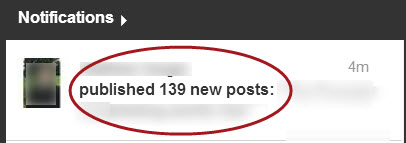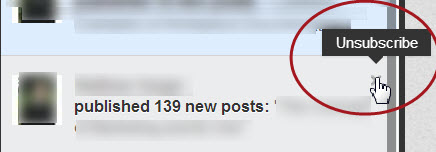 Like any new venture, LinkedIn Publishing has some kinks to work out.
Like any new venture, LinkedIn Publishing has some kinks to work out.
How the networking site handles those kinks could spell success or failure for the Publishing platform.
The following is an unscientific review of early kinks and criticisms.
LinkedIn Publishing
In a previous post, LinkedIn Publishing: Plus or Minus, I shared information about this latest LinkedIn addition.
The new feature allows any LinkedIn member (not only LinkedIn-appointed influencers) to publish long-form posts.
Enough With the Notifications
An early criticism is the annoying flood of Publishing notifications. Members receive one each time a connection posts to Publishing.
The practice has members rethinking their number of connections.
Thanks to a comment from Jennifer Mattern, we discovered as of July 2, 2014, members have an option to unsubscribe from posts. That’s the good news.
The bad news is:
- You need to unsubscribe from each individual connection’s posts
- It is unclear if unsubscribing stops all future Publishing notifications for that person
It’s a band-aid for too many notifications.
There are connections’ posts I want to read. But not right now. The flagged red number forces me to open and review the notification. Okay, maybe it doesn’t force me but it sure does nag. Like a blinking message light.
Perhaps an approach similar to an RSS feed for blog posts would work better.
Any other ideas?
Duplicate Content
LinkedIn Publishing guidelines do not require original content. In fact, a moderator at the Help Center stated the following.
“You can republish something that you have published somewhere else as long as it is your original content that you own the rights to.”
Repurposing content is an accepted practice and even encouraged for several reasons.
However, we have all witnessed the spammy tactics of dumping duplicate content all over the internet for search engine optimization (SEO). Google slaps more than the occasional user of such strategy.
According to the Hubspot blog, Google appears to be taking a wait and see approach with LinkedIn Publishing.
My view is I do not want to read the exact same post over and over, regardless of the platform.
- At a minimum, note at the start that the post was originally posted at such-and-such site
- Repurpose the original with fresh content
- Keep duplicate content to a minimum
Now, I’m not saying this gentleman employs spammy tactics but check out this Notification I received.
I do believe I’ll test out the Unsubscribe option.
UPDATE: After I hit Unsubscribe, I received Notification of 19 more, then 11 more from this gentleman. I don’t know if they were already in the queue, meaning I have to wait for the Unsubscribe action to take effect. He’s up to 194 posts and still counting.
What’s your view on duplicating content for LinkedIn?
Tag You’re It
Like the great Google gods, Facebook Pharaohs, and other platforms’ royalty, LinkedIn has the power to christen your post as worthy.
The world’s mathematicians must now work for social media.
We have yet another algorithm used by LinkedIn that dictates which posts they tag for wider distribution.
- The algorithm constantly changes
- The purpose (or so they say) is to match quality content to members who may have an interest in the subject matter
The Straight Scoop
Social media platforms come and go.
If you are a long-time LinkedIn member like I am, you’ve experienced the loss of popular features.
While I may take Publishing out for a test drive, I know the keys to my writing machine are in my personal vehicle − my own business site.
- Have you tried Publishing?
- What kinks have you seen?
- What do you like about the feature?
===================
Helping you Keep it simple, clear & uniquely yours – contact me for help with your business writing needs.
=====================



Speaking of the loss of popular features, I can’t help but wonder if that’s why I haven’t make LI a bigger part of my daily routine. I’m still quite bitter over the loss of Answers. Yes, there are other Q&A sites on the Web. But they’re littered with utter nonsense. LI’s Q&A area could be taken far more seriously, even if it wasn’t perfect. I have yet to find a worthwhile replacement.
As for LI Publishing, over 100 new posts from one guy?? Yikes! I can’t help but wonder if the annoyance factor on the notifications is going to get people reported for spamming even if they aren’t intentionally doing anything “wrong.”
I’m still very unhappy with how they’ve handled this. Opt-out is never an acceptable option. Things like this should always be opt-in from the start. This feels like a heavy-handed Facebook-like move in trying to force new features and settings down people’s throats.
On the issue of repurposing content, yes and no. I can see companies sharing the same brief news updates on various platforms to make sure they reach all of their customers / followers. But not evergreen content such as tutorials or resource posts. It’s one thing if you rework material from a few older posts and create something new. That type of repurposing can be a great thing and it can help you reach new audiences. But republishing things as-is is not okay in my book. If my connections start doing that, either I’ll kill the connection on LI or I’ll unsubscribe from their blogs. I’m busy enough as it is. I don’t need to duplicate my browsing experience.
I keep wanting to make LI a bigger part of my business efforts, but things like this make it very hard to remain enthusiastic about the platform.
I totally agree with you, Jenn, about Answers. I often whine about the loss. It was my favorite go-to place to get answers and it was also a great networking source without the posturing you get in many Groups.
The guy with 100 (I’m sure there’s more by now) happens to be a freelance writer. Brings shame to our industry. 😉
LI is definitely not what it was when I first joined. What I have found is I still find value but more of that is one-on-one connections versus Groups or any other feature they have. I think Publishing could work if they work out the kinks. I’ve already made some connections from commenting on useful posts (useful in my eyes). Time will tell.
Thanks, Jenn, for sharing your thoughts.
I wonder if it makes sense to look at linkedin publishing as a reprint market… no clue what google thinks of that… but I’m wondering if it might work like selling the same piece to two print magazines – usually a large, well paying one and then to a smaller less well paying with different demographics.
Just a thought… no conclusions.
My understanding is Google is okay (so far) with duplicating content from another source provided it’s not some spammy SEO tactic. Although LinkedIn won’t pay for posts.
I’ve also been getting a lot of notifications of published work on LI, and I agree with what’s been said above. I wonder if a published article goes beyond one’s own connections. I also wonder if it’s indexed by Google.
Yes, it can go beyond connections, John. As I mentioned in the post, LI can opt to “tag” the post for wider distribution.
What I have seen so far on indexing is the following: “At the moment there is no proof Google will pick up the LinkedIn posts and index them (likely they will). ” Not sure how accurate it is.
I would want google to say it’s okay… a wait and see attitude sounds like it could bite down the road.
I think Google has but I’ll have to look. At least I think I remember reading something about it but that could just be wishful thinking. Or boomer brain – again. 😉